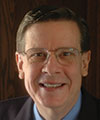The Happiness Formula
 Ed Diener has focused his career on uncovering the essential ingredients to subjective well-being, a term that includes positive feelings and life satisfaction. Nicknamed “Dr. Happiness,” Diener developed the Satisfaction with Life Scale and other measures of psychological well-being. In one noteworthy study, conducted with Martin E.P. Seligman, he found that students with the highest levels of happiness and fewest signs of depression had strong ties to friends and family. Another important finding is that there are some universals in what predicts happiness around the globe, such as trust and respect, but there are also some culture-specific causes as well. For example, self-esteem is more predictive of subjective well-being in individualistic cultures, and religiosity is more predictive of life satisfaction in highly religious societies. According to Diener’s research, even the majority of disadvantaged people, including those with disabilities, report greater-than-neutral levels of happiness. A new direction in Diener’s research is examining the outcomes of subjective well-being, and he has found that in general it leads to better health and social relationships, to greater work productivity, and to better citizenship. His empirical examination of happiness has contributed enormously to the understanding of human well-being. Diener is the recipient of a 25th anniversary APS William James Fellow Award for his significant intellectual contributions to the basic science of psychology. Read more about Diener’s research here.
Ed Diener has focused his career on uncovering the essential ingredients to subjective well-being, a term that includes positive feelings and life satisfaction. Nicknamed “Dr. Happiness,” Diener developed the Satisfaction with Life Scale and other measures of psychological well-being. In one noteworthy study, conducted with Martin E.P. Seligman, he found that students with the highest levels of happiness and fewest signs of depression had strong ties to friends and family. Another important finding is that there are some universals in what predicts happiness around the globe, such as trust and respect, but there are also some culture-specific causes as well. For example, self-esteem is more predictive of subjective well-being in individualistic cultures, and religiosity is more predictive of life satisfaction in highly religious societies. According to Diener’s research, even the majority of disadvantaged people, including those with disabilities, report greater-than-neutral levels of happiness. A new direction in Diener’s research is examining the outcomes of subjective well-being, and he has found that in general it leads to better health and social relationships, to greater work productivity, and to better citizenship. His empirical examination of happiness has contributed enormously to the understanding of human well-being. Diener is the recipient of a 25th anniversary APS William James Fellow Award for his significant intellectual contributions to the basic science of psychology. Read more about Diener’s research here.





APS regularly opens certain online articles for discussion on our website. Effective February 2021, you must be a logged-in APS member to post comments. By posting a comment, you agree to our Community Guidelines and the display of your profile information, including your name and affiliation. Any opinions, findings, conclusions, or recommendations present in article comments are those of the writers and do not necessarily reflect the views of APS or the article’s author. For more information, please see our Community Guidelines.
Please login with your APS account to comment.